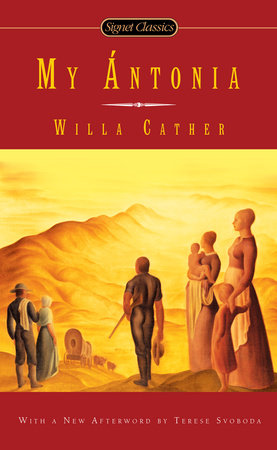My Antonia Reading Guide for Class Discussion
by Willa Cather
- About Willa Cather
- Questions for Discussion
- More Penguin Classics
- Buy this Book!
Enter promo code TEACH for 15% off.
INTRODUCTION
By John Murphy
The Best Days Are the First to Flee:
"This girl seemed to mean to us the country, the conditions, the whole adventure of our childhood. To speak her name was to call up pictures of people and places, to set a quiet drama going in one's brain."
Nearly every page of Willa Cather's simple story of a young man's life in Nebraska is infused with an intense nostalgia – for the past, for the countryside, for the irrepressible spirit of youth. Its narrator, Jim Burden, comes to the Midwest an orphan. He is instantly overwhelmed by the prairie's endless expanses and vast sky: a dome so big it threatens to blot out his existence.
Late nineteenth-century Nebraska was a Midwestern melting pot of immigrant farmers. Swedes, Norwegians, Russians, French, and Bohemians alike conjoined on the harsh prairie to nudge a living out of it. On a poor plot of land abutting Jim's grandparents' flourishing farm, a family of Bohemian immigrants struggles to survive. Jim is immediately taken by their oldest daughter, Antonia, a cheerful, resourceful young woman who shoulders much of the responsibility for the family and the farm. While on the prairie, the two young people form a strong bond, each teaching the other vital lessons. Eventually, Jim's family moves to the town of Black Hawk. Antonia soon follows, employed in the household of the Burden's neighbors.
In Black Hawk, Jim and Antonia's friendship begins to change. Social constraints bind Jim to the merchants, lawyers, and scholars of his station, while Antonia is relegated to the status of "hired girl" and other immigrant denizens whose faulty English and crude country ways limit their possibilities for advancement. Again and again, Jim finds himself in the company of Antonia and her friends, drawn to their vivacious natures and their open enjoyment of life. Antonia thrives in this setting, away from her family, where her independence and courage are both asset and liability. Inevitably Jim and Antonia's lives diverge: He moves to the East coast to pursue a successful career as an attorney; she falls in love with a scoundrel who promises to marry her but instead impregnates and then deserts her. Disconcerted, Antonia returns to the prairie to raise her illegitimate daughter on the family farm.
It is many years before Jim makes his return to the prairie. He is prosperous, well-educated, and cultured, and fears guiltily that he will find Antonia impoverished, her spirit broken by the hardships she has endured. Instead he finds the Antonia of his youth, her passion for life everywhere evident: in the family she has raised, in the home she keeps, and in her flourishing farm. Having come full circle, Jim has rediscovered his youth: Antonia will always represent the best of his life. She is his everywoman – wife, mother, sister. She is the endless prairie and the immense sky.
For Jim Burden, recalling one's fondest childhood memories is more than just a nostalgic exercise – it is succor for a heavy heart, a way of immersing oneself in a spiritual and energizing bath. But it is Jim Burden's bittersweet recollections of a life he left behind that resonate most distinctly with readers, regardless of sex, stature, or ethnicity. Living as we do in a rapidly changing world, in which prairies and pioneers have all but disappeared, Cather's story, nearly a century old, possesses a chilling relevance: Are we forever doomed to pine for that which we once had, but lost?
ABOUT WILLA CATHERMany of the events in My Antonia grew out of Willa Cather's own life. Like her hero, Jim Burden, she moved from her family's Virginia home to a Nebraska farm in 1883 at the age of ten. Although Willa's parents accompanied her on the journey, there is every evidence that the upheaval from the hills and valleys of the south to a part of the country that appeared "as bare as a piece of sheet iron," was traumatic for the young girl. However, Willa grew to love the prairie. It was a love that inspired her first three novels, O Pioneers!, The Song of the Lark, and My Antonia.
Cather attended college at the University of Nebraska, where she was quite involved in the theater, both performing in and reviewing plays. But the Midwest proved too sleepy for this adventurous woman, and she relocated to Pittsburgh, where she made her living as a journalist and teacher, and eventually to New York, where her career blossomed. As managing editor of the muckraking McClure's magazine, Willa Cather established herself as one of her era's leading journalists. Although she was a prolific writer of articles, reviews and short fiction, Cather did not publish her first novel until 1912, at the age of 38. Alexander's Bridge did not meet with critical success – even Cather herself claims to have disliked it – but in the next five years she churned out the three novels that make up her "prairie trilogy," which garnered the attention of reviewers and readers across the country and established Cather as a writer to watch. During the next thirty-five years, she published fourteen novels and one collection of short stories. Many of her works celebrate America's harshest landscapes and the people, especially women, who thrive in these settings. In 1922, Cather was awarded the Pulitzer Prize for One of Ours, a novel about a farm boy who dreams of achieving greatness in the European Wars. Willa Cather died in 1941 in her home in New York, leaving behind a legacy of literature and empathy for the pioneer spirit that will live on forever.





